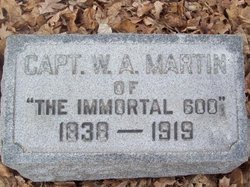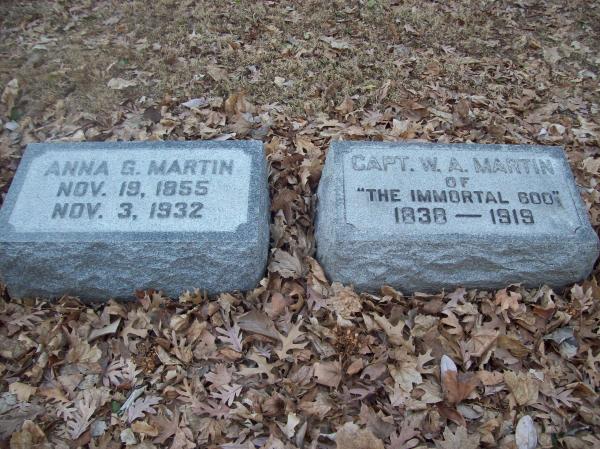1838-1919
Obituary - Courier Journal newspaper, Louisville, KY
Tuesday 2 April 1918
MARTIN - Sunday, March 31, at 12:45 p.m., Wm. A. Martin, aged 80 years. Funeral from his late residence, 1367 South Brook Street, Tuesday afternoon at 2:30 o'clock. Burial private. Interment in Cave Hill Cemetery.
Lodges and Societies Notices - same day, next column
Members of the George B. Eastin Camp, No. 803, U. C. V., are invited to attend the funeral of our late comrade, William A. Martin, this afternoon at 2:30 o'clock from his late residence, 1367 Brook Street.
W. A. Milton, Commandant
Capt. William A. Martin, Seventh Infantry; residence, Baton Rouge; captured at Spottsylvania May 19, 1864.
Fort Pulaski,Savannah, GA
"The Immortal 600" was a special group of Confederate prisoners incarcerated at Fort Pulaski during the fall and winter of 1864-65. The Immortal 600 prisoners were Confederate officers who were captured at various battlefields. While at Fort Pulaski these prisoners were placed on starvation diets, and were denied warm clothing and firewood for their damp quarters. Thirteen of these prisoners died at Fort Pulaski, and were buried outside the fort.
The story of the Immortal 600 began on August 20, 1864, when a chosen group of 600 Confederate prisoners of war were transferred from the Fort Delaware Prison to Federally- occupied Morris Island, South Carolina. The purpose of the move was to place these men into a cramped stockade in front of Union artillery positions, to literally use these prisoners as human shields. There they remained, in an open 1.5-acre pen, under the shelling of friendly Confederate artillery fire. Three men died on the starvation rations issued as retaliation for the conditions of the Union prisoners held at Andersonville, Georgia and Salisbury, North Carolina.
On October 21, after 45 days under fire, the weakened survivors were removed to Fort Pulaski, and crowded into the fort's cold, damp casemates. For 42 days, a "retaliation ration" of 10 ounces of moldy cornmeal and soured onion pickles was the only food issued to the prisoners. Thirteen men died at Fort Pulaski, and five later died at Hilton Head Island, South Carolina. The remaining prisoners were returned to Fort Delaware on March 12, 1865, where an additional twenty-five died. The Immortal 600 became famous throughout the South for their adherence to principle and for refusing to take the Oath of Allegiance under extremely adverse circumstances.
1838-1919
Obituary - Courier Journal newspaper, Louisville, KY
Tuesday 2 April 1918
MARTIN - Sunday, March 31, at 12:45 p.m., Wm. A. Martin, aged 80 years. Funeral from his late residence, 1367 South Brook Street, Tuesday afternoon at 2:30 o'clock. Burial private. Interment in Cave Hill Cemetery.
Lodges and Societies Notices - same day, next column
Members of the George B. Eastin Camp, No. 803, U. C. V., are invited to attend the funeral of our late comrade, William A. Martin, this afternoon at 2:30 o'clock from his late residence, 1367 Brook Street.
W. A. Milton, Commandant
Capt. William A. Martin, Seventh Infantry; residence, Baton Rouge; captured at Spottsylvania May 19, 1864.
Fort Pulaski,Savannah, GA
"The Immortal 600" was a special group of Confederate prisoners incarcerated at Fort Pulaski during the fall and winter of 1864-65. The Immortal 600 prisoners were Confederate officers who were captured at various battlefields. While at Fort Pulaski these prisoners were placed on starvation diets, and were denied warm clothing and firewood for their damp quarters. Thirteen of these prisoners died at Fort Pulaski, and were buried outside the fort.
The story of the Immortal 600 began on August 20, 1864, when a chosen group of 600 Confederate prisoners of war were transferred from the Fort Delaware Prison to Federally- occupied Morris Island, South Carolina. The purpose of the move was to place these men into a cramped stockade in front of Union artillery positions, to literally use these prisoners as human shields. There they remained, in an open 1.5-acre pen, under the shelling of friendly Confederate artillery fire. Three men died on the starvation rations issued as retaliation for the conditions of the Union prisoners held at Andersonville, Georgia and Salisbury, North Carolina.
On October 21, after 45 days under fire, the weakened survivors were removed to Fort Pulaski, and crowded into the fort's cold, damp casemates. For 42 days, a "retaliation ration" of 10 ounces of moldy cornmeal and soured onion pickles was the only food issued to the prisoners. Thirteen men died at Fort Pulaski, and five later died at Hilton Head Island, South Carolina. The remaining prisoners were returned to Fort Delaware on March 12, 1865, where an additional twenty-five died. The Immortal 600 became famous throughout the South for their adherence to principle and for refusing to take the Oath of Allegiance under extremely adverse circumstances.
Inscription
Capt. W. A. Martin of "The Immortal 600"
1838-1919
Family Members
Sponsored by Ancestry
Advertisement
Explore more
Sponsored by Ancestry
Advertisement




